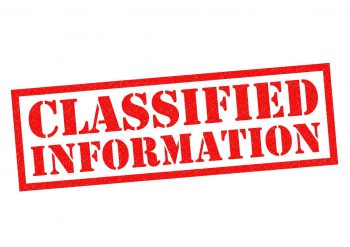YOU LOSE YOUR JOB!
Jobs That Require a Security Clearance
Anyone with access to classified data requires a clearance at or higher than the level at which the data is classified. For this reason, security clearances are required for a wide range of jobs, from senior management to janitorial.
According to a 2014 Washington Post article, 5.1 million Americans hold security clearances and over 1.5 million of those were top-secret clearances; almost one-third of them worked for private companies, rather than for the U.S. government.
Jobs that require a security clearance can be found either as positions working directly for the federal government or as authorized federal contractors. Over time, more clearance jobs are being outsourced to contractors. Due to an overall shortage in security-cleared candidates and a long time frame to obtain the credentials for an uncleared worker, those with clearance are often paid more than their non-cleared equivalent counterparts. According to one 2010 estimate, “people with security clearances are in the top 10 percent of wage earners in the country“.
FAIR WARNING: This is an apolitical article! So if your interest is in the political aspects of the recent news surrounding this subject matter, you might as well stop reading now.
Before you seek out that job that requires a security clearance, I suggest you read the following, unless you’re considering to run for President of the United States because then it just doesn’t matter.
Adjudicative Guidelines for Determining Eligibility for Access to Classified Information
Adjudicative guidelines are established for all U.S. government civilian and military personnel, consultants, contractors, employees of contractors, licensees, certificate holders or grantees and their employees and other individuals who require access to classified information.
They apply to persons being considered for initial or continued eligibility for access to classified information, to include sensitive compartmented information and special access programs, and are to be used by government departments and agencies in all final clearance determinations.
Government departments and agencies may also choose to apply these guidelines to analogous situations regarding persons being considered for access to other types of protected information.
You can learn more, if you want to. Where else? At the Department of State.
APOLITICAL WARNING AGAIN: The President of the United States may be given access to any government or military information that they request if there is a proper “need to know”, even if they would not otherwise be able to normally obtain a security clearance were they not the President.
For what reasons would I be denied a security clearance?
Various reasons exist for why someone may be denied a security clearance. The most important factors in an investigation are the individual’s honesty, candor, and thoroughness in the completion of their security clearance forms.
Every case is individually assessed, using the National Security Board’s 13 Adjudicative Guidelines, to determine whether the granting or continuing of eligibility for a security clearance is clearly consistent with the interests of national security.
Those thirteen guidelines are listed using the first thirteen letters of the alphabet or, guidelines A-M.
GUIDLINE K (or number 11 of the 13) is:
Handling Protected Information
The Concern – Deliberate or negligent failure to comply with rules and regulations for protecting classified or other sensitive information raises doubt about an individual’s trustworthiness, judgment, reliability, or willingness and ability to safeguard such information, and is a serious security concern.
Conditions that could raise a security concern and may be disqualifying include:
(a) deliberate or negligent disclosure of classified or other protected information to unauthorized persons, including but not limited to personal or business contacts, to the media, or to persons present at seminars, meetings, or conferences;
(b) collecting or storing classified or other protected information in any unauthorized location;
(c) loading, drafting, editing, modifying, storing, transmitting, or otherwise handling classified reports, data, or other information on any unapproved equipment including but not limited to any typewriter, word processor, or computer hardware, software, drive, system, gameboard, handheld, “palm” or pocket device or other adjunct equipment;
(d) inappropriate efforts to obtain or view classified or other protected information outside one’s need to know;
(e) copying classified or other protected information in a manner designed to conceal or remove classification or other document control markings;
(f) viewing or downloading information from a secure system when the information is beyond the individual’s need to know;
(g) any failure to comply with rules for the protection of classified or other sensitive information;
(h) negligence or lax security habits that persist despite counseling by management;
(i) failure to comply with rules or regulations that results in damage to the National Security, regardless of whether it was deliberate or negligent.
Conditions that could mitigate security concerns include:
(a) so much time has elapsed since the behavior, or it happened so infrequently or under such unusual circumstances that it is unlikely to recur or does not cast doubt on the individual’s current reliability, trustworthiness, or good judgment;
(b) the individual responded favorably to counseling or remedial security training and now demonstrates a positive attitude toward the discharge of security responsibilities;
(c) the security violations were due to improper or inadequate training.
I will say that it is unlikely that item or guideline “K” would prevent you from obtaining a security clearance, since you would not be documented mishandling information that you have not yet been authorized to handle.
However, once you obtain a clearance, you should exercise care in the handling of same.
J. Robert Oppenheimer, the American born theoretical physicist who headed the Los Alamos Laboratory during the Manhattan Project and who became known as the “Father of the Atomic Bomb”, lost his security clearance in 1954.


 This has been a hot topic in the news recently and is a subject with which I am very familiar, not just from my Army days, but from my daily activity as a Tax Advisor. My firm prepares tax returns and represents more than 600 individuals who possess security clearances at the Secret level or above. I can tell you first-hand, that all of these people are concerned that their taxes are prepared correctly, filed timely and that all of their taxes are properly paid.
This has been a hot topic in the news recently and is a subject with which I am very familiar, not just from my Army days, but from my daily activity as a Tax Advisor. My firm prepares tax returns and represents more than 600 individuals who possess security clearances at the Secret level or above. I can tell you first-hand, that all of these people are concerned that their taxes are prepared correctly, filed timely and that all of their taxes are properly paid.


Facebook Comments